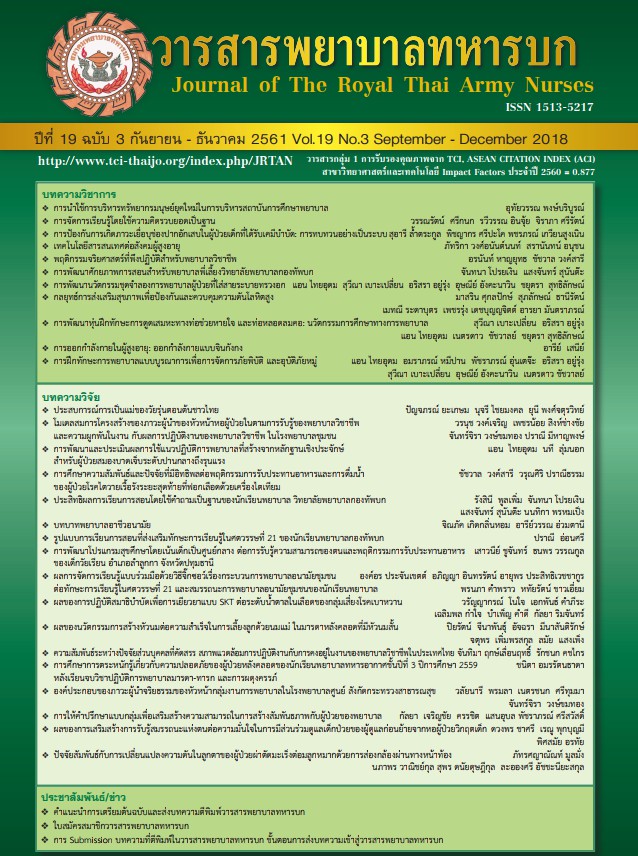Effects of Somporn Kantharadussadee Triumchaisri (SKT) Meditation on Blood Glucose Levels of Pre-diabetes Mellitus
Keywords:
Meditation, Blood Glucose Levels, Pre-diabetes MellitusAbstract
This quasi experimental research aimed to study the effects of SKT 1 & 3 meditation technique on blood glucose levels of pre-diabetes group. The 60 participants were as identified and equally recruited 30 persons per group into the experimental and control groups. The experimental group practicing SKT 1 & 3 meditation technique for 8 weeks. The control group had usual care provided by Bantun Sub-district Health Promoting Hospital. Data were collected by quantitative method using an automatic blood glucometer On call® Advanced Glucose Control Solution by ACON Laboratories, lnc. The paired samples t -test was used to compare blood glucose levels between before and after intervention of meditation practice. The Independent samples t-test was employed to compare blood glucose levels between groups after completion of intervention The results revealed that after practicing the SKT, the participants had significantly (p < .05) lower blood glucose level (mean = 96.76, S.D = 6.51) than before the intervention (mean = 112.10, S.D = 8.26). Blood glucose levels of the participants in the experiment group were significantly (p < .05) lower (mean = 96.76, S.D = 6.51) than that (mean = 107.90, S.D = 9.97) among the control group.
Downloads
References
2. Diabetes Association of Thailand. Clinical Practice Guideline for Diabetes 2017.
3. Bureau of Non-Communicable Disease Control Department, Ministry of Public Health. Annual Report 2016.
4. Anothaisintawee, T. Progression rate to diabetes mellitus and association between sleep factors, serum uric acid level, and HbA1c level in pre-diabetic people. 2018. (in Thai)
5. American Diabetes Association. Standards of medical care in diabetes-2009. Diabetes Care, January,32 (supplement 1), s13-s61 ; 2009.
6. Artsanthia J, Sari NPWP. The Effect of Meditation-Healing Exercise in Elderly who are Live with Non-Communicable Disease In Bangkok and Surabaya. Journal of The Royal Thai Army Nurses. 2018;19 (1):74-82. (in Thai)
7. Dinardo, M.M. Mind-body therapies in diabetes management. Diabetes Spectrum, 2009;22 (1), 30-34
8. Jeffery A Dusek, and Herbert Benson. Mind-Body Medicine A Model of the Comparative Clinical Impact of the Acute Stress and Relaxation Responses. Minnesota Medicine. 2009; 92 (5): 47-50.
9. Sanchai, A., Pothiban, L. & Nanasilp, P. Effect of Thai Qigong Meditation Exercise on Hemoglobin A1c Level of the Elderly with Type 2 Diabetes Mellitus. Nursing Journal 2011; 38(4): 65-80. (in Thai)
10. Phuwilert, P., Kedthongma, W., & Triamchaisri, S.K. The Effect of SKT 7 Meditation Practice on Stress in Stroke’s Patients. Research and Development Health System Journal 2016; 9(3): 37-43. (in Thai)
11. Naewbood, S. Effect of Practicing SKT 2 Healing Meditation To Blood Pressure Level of Essential Hypertensive Patients. Journal of Nursing and Health Sciences. 2014; 9(3): 14-22. (in Thai)
12. Anchalisankasa, S. The study of Efficacy of Complementaried Treatment of Diabetes Mallitus type II with Yoga. Journal of Bureau of Alternative Medicine. 2010; 9(3):36-43. (in Thai)
13. Triamchaisri, S.K. Meditation for holistic self –healing and cells healing. Mahasarakham: Mahasarakham University;2015. (in Thai).
14. Bantun Sub-district Health Promoting Hospital. Diabetes Screening Report 2016. (in Thai)
15. Thabane L. Sample Size Determination in Clinical Trials. Department of Clinical Epidemiology & Biostatistics Faculty of Health Sciences Mc Master University Hamilton On, 2004.
16. Gainey, A., Himatongkam, T., & Tanaka, H. Effects of Buddhist walking meditation on glycemic control and vascular function in patients with type 2 diabetes. complementary therapies in medicine. 2016; 26: 92-97.
17. Chaiopanont, S. Hypoglycemic Effect of Sitting Breathing Meditation Exercise on Type 2 Diabetes at Wat Khae Nok Primary Health Center in Nonthaburi Province. Journal Medical Association Thailand. 2018; 91(1), 93-98. (in Thai)
18. Suwanakitch, P., Sukted, P.,Wongsa, S., & Audta, o. Effects of the Sahaja Yoga Practice on Blood Pressure, Heart rate and Stress among Hypertension Patients. Journal of Nursing and Health Sciences. 2553;4(2): 28-35. (in Thai)
19. Andresen, J. Meditation meets behavioralmedicine: the story of experimental research on meditation. Journal of Conscious Study. 2000; 7 (11-12): 17-73.
20. Supaporn N. Effect of practicing SKT 2 healingmeditation to blood pressure level of essential hypertensive patients. Journal of Nursing and Health Sciences 2015;9:14-22. (in Thai)
21. Chibsamanboon, P., Suttineam, U. Effects of the Somporn Kantaradusdi-Triamchaisri Technique 2 (SKT 2) on Blood Pressure Levels and Biochemical Markers. Journal of Boromarajonani College of Nursing, Bangkok. 2013; 29(2): 122-133. (in Thai)
22. Prasawang, N., Koshakri, R., & Jewpattanakul, Y. Effects of the Sitting Breathing Meditation Combined with Usual Care on Blood Pressure among Patients with Essential Hypertension in Primary Care Unit. Journal of Nursing and Health Care. 2018; 36(1): 33-42 (in Thai)
23. Ruedej, R., Nimit-arnun, N., & Roojanavech, S. The Effects of Buddhist Meditation Therapy Program on Life Happiness of the Elderly with Hypertension at a Community in Phetchaburi Province. Journal of The Royal Thai Army Nurses. 2018; 19 (Supplement): 289-298. (in Thai)
24. Panyachotikun, A., Satkong, S., & Sriwisit, S. Effects of SKT Meditation Therapy for Lowering Blood Pressure Level of Patients with Hypertension in Sikao Hosptial, Trang Province. The Southern College Network Journal of Nursing and Public Health. 2017; 4(2): 245-255.
25. Tongpeth, J. Effectiveness of Self - Management Promoting Potential Program on Blood Sugar Control and Quality of Life Among Diabetes Mellitus Type 2 Patients. Journal of The Royal Thai Army Nurses. 2013; 14 (2): 69-78. (in Thai)
Downloads
Published
How to Cite
Issue
Section
License
บทความหรือข้อคิดเห็นใดใดที่ปรากฏในวารสารพยาบาลทหารบกเป็นวรรณกรรมของผู้เขียน ซึ่งบรรณาธิการหรือสมาคมพยาบาลทหารบก ไม่จำเป็นต้องเห็นด้วย
บทความที่ได้รับการตีพิมพ์เป็นลิขสิทธิ์ของวารสารพยาบาลทหารบก
The ideas and opinions expressed in the Journal of The Royal Thai Army Nurses are those of the authors and not necessarily those
of the editor or Royal Thai Army Nurses Association.






